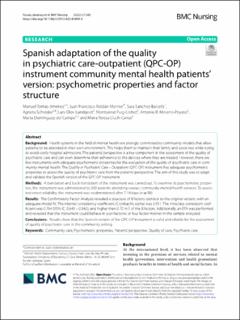| dc.contributor.author | Tomás-Jiménez, Manuel | |
| dc.contributor.author | Roldán-Merino, Juan Francisco | |
| dc.contributor.author | Sanchez-Balcells, Sara | |
| dc.contributor.author | Schröder, Ingrid Agneta | |
| dc.contributor.author | Lundqvist, Lars-Olov | |
| dc.contributor.author | Puig-Llobet, Montserrat | |
| dc.contributor.author | Moreno-Poyato, Antonio R. | |
| dc.contributor.author | Domínguez del Campo, Marta | |
| dc.contributor.author | Lluch-Canut, Maria Teresa | |
| dc.date.accessioned | 2023-01-30T13:30:40Z | |
| dc.date.available | 2023-01-30T13:30:40Z | |
| dc.date.created | 2022-11-30T12:36:28Z | |
| dc.date.issued | 2022 | |
| dc.identifier.citation | BMC Nursing. 2022, 21 . | en_US |
| dc.identifier.issn | 1472-6955 | |
| dc.identifier.uri | https://hdl.handle.net/11250/3047156 | |
| dc.description.abstract | Background
Health systems in the field of mental health are strongly committed to community models that allow patients to be attended in their own environment. This helps them to maintain their family and social ties while trying to avoid costly hospital admissions. The patients’ perspective is a key component in the assessment of the quality of psychiatric care and can even determine their adherence to the devices where they are treated. However, there are few instruments with adequate psychometric properties for the evaluation of the quality of psychiatric care in community mental health. The Quality in Psychiatric Care – Outpatient (QPC-OP) instrument has adequate psychometric properties to assess the quality of psychiatric care from the patients’ perspective. The aim of this study was to adapt and validate the Spanish version of the QPC-OP instrument.
Methods
A translation and back-translation of the instrument was carried out. To examine its psychometric properties, the instrument was administered to 200 patients attending various community mental health services. To assess test-retest reliability, the instrument was readministered after 7-14 days (n = 98).
Results
The Confirmatory Factor Analysis revealed a structure of 8 factors identical to the original version, with an adequate model fit. The internal consistency coefficient (Cronbach’s alpha) was 0.951. The intraclass correlation coefficient was 0.764 (95% IC: 0.649 – 0.842), and higher than 0.70 in 5 of the 8 factors. Additionally, an EFA was performed and revealed that the instrument could behave in a unifactorial or four factor manner in the sample analyzed.
Conclusions
Results show that the Spanish version of the QPC-OP instrument is valid and reliable for the assessment of quality of psychiatric care in the community setting. | en_US |
| dc.language.iso | eng | en_US |
| dc.publisher | BMC | en_US |
| dc.rights | Navngivelse 4.0 Internasjonal | * |
| dc.rights.uri | http://creativecommons.org/licenses/by/4.0/deed.no | * |
| dc.title | Spanish adaptation of the quality in psychiatric care-outpatient (QPC-OP) instrument community mental health patients’ version: psychometric properties and factor structure | en_US |
| dc.title.alternative | Spanish adaptation of the quality in psychiatric care-outpatient (QPC-OP) instrument community mental health patients’ version: psychometric properties and factor structure | en_US |
| dc.type | Peer reviewed | en_US |
| dc.type | Journal article | en_US |
| dc.description.version | publishedVersion | en_US |
| dc.source.pagenumber | 11 | en_US |
| dc.source.volume | 21 | en_US |
| dc.source.journal | BMC Nursing | en_US |
| dc.identifier.doi | 10.1186/s12912-022-01094-8 | |
| dc.identifier.cristin | 2085572 | |
| cristin.ispublished | true | |
| cristin.fulltext | original | |
| cristin.qualitycode | 1 | |

